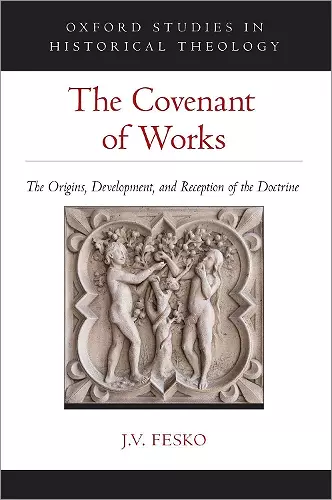The Covenant of Works
The Origins, Development, and Reception of the Doctrine
Format:Hardback
Publisher:Oxford University Press Inc
Published:3rd Nov '20
Currently unavailable, and unfortunately no date known when it will be back

The doctrine of "the covenant of works" arose to prominence in the late sixteenth century and quickly became a regular feature in Reformed thought. Theologians believed that when God first created man he made a covenant with him: all Adam had to do was obey God's command to not eat from the tree of knowledge and obey God's command to be fruitful, multiply, and subdue the earth. The reward for Adam's obedience was profound: eternal life for him and his offspring. The consequences of his disobedience were dire: God would visit death upon Adam and his descendants. In the covenant of works, Adam was not merely an individual but served as a public person, the federal head of the human race. The Covenant of Works explores the origins of the doctrine of God's covenant with Adam and traces it back to the inter-testamental period, through the patristic and middle ages, and to the Reformation. The doctrine has an ancient pedigree and was not solely advocated by Reformed theologians. The book traces the doctrine's development in the seventeenth century and its reception in the eighteenth, nineteenth, and twentieth centuries. Fesko explores the reasons why the doctrine came to be rejected by some, even in the Reformed tradition, arguing that interpretive methods influenced by Enlightenment thought caused theologians to question the doctrine's scriptural legitimacy.
Fesko has produced an instructive survey of the covenant of works within the Reformed tradition that reveals not only the exegetical moorings of the doctrine for early modern theologians but also the nexus of theological realities that are bound up with it...I hope Fesko's work aids in disabusing long held and wrongheaded tropes about Reformed orthodoxy and, in turn, renders a now 'strange' doctrine once again familiar to the Reformed consciousness. * Phillip Hussey, Covenant Theological Seminary, Saint Louis, MO, USA, Journal of Reformed Theology *
this book offers a clear and compelling argument, covers a remarkable range of historical ground, and treats an important theological topic in a surprisingly accessible way. Its impressive scope not only introduces the reader to some significant but less well-known Reformed theologians but qualifies it as a handy, if topically focused, primer to the historyof Reformed thought as a whole. * Stephen Hampton, Church History *
Dr. Fesko gives us in a learned and accessible style an insightful overview of the sources and the history of the covenant as the central theme in biblical and reformed theology. This book will for long be the standard work on this fascinating doctrine. * Herman Selderhuis, Director Refo500 at Theological University of Apeldoorn *
By drawing together an array of exegetical and confessional sources, Dr. Fesko traces the historical development in federal theology in various stages and points throughout the early modern period, demonstrating its foundational importance for subsequent doctrinal formulations among Reformed and Presbyterian theologians. This insightful work illustrates not only the integral position of the covenant of works in Reformed thought but also how its function in Reformed theology shaped generations of theologians and theological debates into the present day. * Dr. Todd Rester, Associate Professor of Church History, Westminster Theological Seminary *
Despite appearing in the Westminster Confession of Faith, the doctrine of the covenant of works is both less studied and more criticized than many other doctrines. In this important book, Fesko sympathetically traces the fortunes of the covenant of works from the sixteenth-century to the present. Fesko makes a compelling case that the doctrine has roots in both early modern exegesis and doctrinal elements prior to the Reformation. * David Sytsma, author of Richard Baxter and the Mechanical Philosophers *
ISBN: 9780190071363
Dimensions: 239mm x 160mm x 25mm
Weight: 612g
324 pages